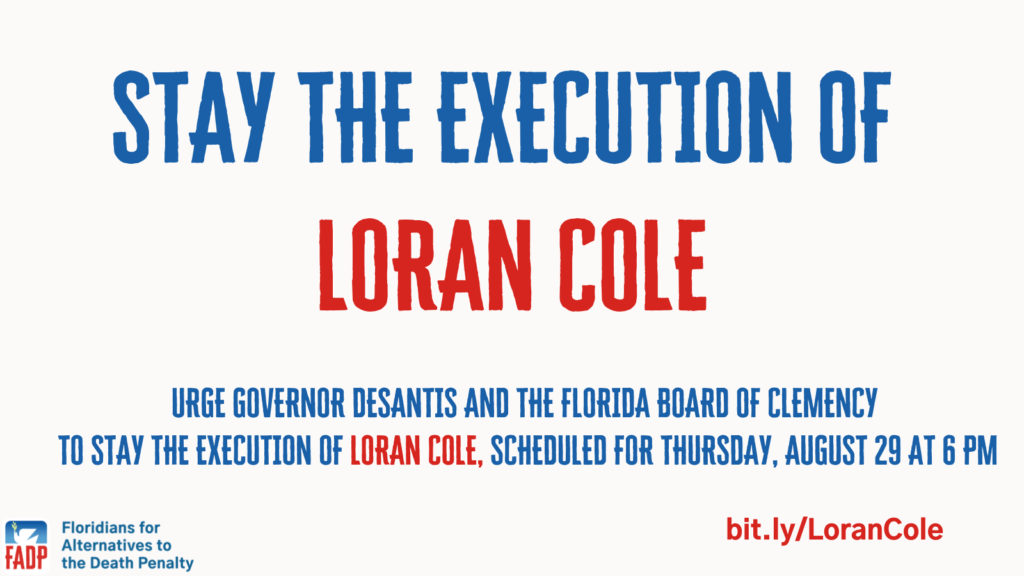Thank you for signing the petition. Loran Cole has been sentenced to death for the 1994 murder of John Edwards, a crime that has profoundly impacted Edwards’ family and a surviving victim. While we mourn the loss and suffering inflicted upon Edwards’ loved ones, we believe that understanding Cole’s tragic past is crucial in evaluating his current situation.
Loran Cole’s life took a devastating turn due to the severe neglect, physical, and sexual abuse he endured at the Arthur G. Dozier School for Boys—a notorious reform school once described by NPR as “a horror tale come to life.” The trauma Cole experienced at this institution profoundly shaped his life and contributed to the circumstances leading up to the crime for which he was convicted.
The Arthur G. Dozier School for Boys has been widely criticized for its brutal treatment of its wards, and Cole’s experiences there are a grim reflection of the institution’s legacy. The abuse and trauma inflicted upon him during his formative years cannot be overlooked when assessing his actions as an adult.
We, alongside Floridians for Alternatives to the Death Penalty (FADP), are calling upon the Florida Board of Executive Clemency and Governor Ron DeSantis to reconsider Cole’s sentence. We urge them to stay his execution, which is scheduled for August 29, and commute his sentence to life in prison without the possibility of parole.
Our call is not intended to diminish the gravity of Cole’s crime or the pain experienced by his victims and their families. We fully acknowledge and mourn the tragic impact of his actions. However, we also believe that Cole’s background—marked by severe trauma and abuse—played a significant role in shaping his actions.
By commuting Cole’s sentence, the State of Florida would make a powerful statement: that it is possible to hold individuals accountable for their actions while also acknowledging and addressing the deep-rooted factors that contribute to criminal behavior. The death penalty does not heal or resolve the underlying issues of violence and trauma; instead, it perpetuates the cycle of violence.
We advocate for a justice system that recognizes the complexities of human behavior and the impacts of systemic abuse. Life imprisonment without parole serves as a viable alternative that ensures public safety while allowing for a more nuanced approach to justice. It also sends a message that Florida seeks to break the cycle of violence rather than perpetuate it.
Please join us in this plea for justice and compassion by signing FADP’s petition and urging the Florida Board of Executive Clemency and Governor Ron DeSantis to commute Loran Cole’s sentence. Your support can contribute to a more just and humane approach to criminal justice, one that balances accountability with a recognition of the profound impacts of past trauma.
In addressing Cole’s situation, let us strive for a system that reflects both justice and mercy, acknowledging the full context of an individual’s life while upholding the principles of accountability and public safety.
On April 13, 2023, Florida Governor Ron DeSantis signed into law Senate Bill 300, known as the Heartbeat Protection Act. This legislation significantly impacts abortion regulations in the state by prohibiting most abortions once a detectable heartbeat is present in the unborn child.
The Heartbeat Protection Act is part of a broader trend among various states seeking to restrict abortion access by implementing earlier prohibitions based on fetal development. In practical terms, this means that once a fetal heartbeat can be detected—often around six weeks into pregnancy—the law would generally prevent abortions from being performed. This is a substantial shift from previous regulations that allowed abortions later into pregnancy under certain conditions.
Governor DeSantis and supporters of the bill argue that the legislation is a critical step in protecting the rights of the unborn, asserting that the presence of a heartbeat signifies a developing life deserving of legal protection. They view the bill as a moral and ethical imperative aimed at aligning state law with their beliefs about the beginning of life.
Opponents of the Heartbeat Protection Act, however, argue that the bill imposes significant restrictions on reproductive rights and could severely limit access to abortion services, particularly for those who may not realize they are pregnant until after the six-week mark. Critics also express concern that such laws can have broad implications for women’s health and autonomy, emphasizing that the six-week timeframe often does not provide sufficient opportunity for women to make informed decisions or access necessary medical care.
The signing of SB 300 represents a landmark moment in Florida’s legislative landscape and reflects the ongoing national debate over abortion rights and regulations. The law’s impact will likely be closely monitored, both within Florida and across the United States, as it could influence future legislative actions and legal challenges related to reproductive health.


